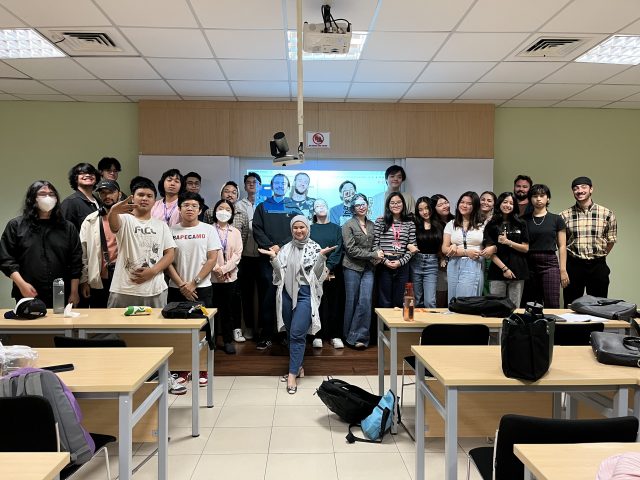What students says about the guest lecture on “mindful listening”?

What is mindful listening?
Mindful listening is defined as an act of listening that involves mindful attention, both physically and mentally, to the speaker. According to Julia T Wood (2016) in her book Interpersonal Communication: Everyday Encounters, mindful listening requires the following aspects:
- Mindfulness
- Physically receiving messages
- Messages selection and organization
- Interpretation
- Responding
- Remembering
Mastering the art of listening to build a stronger interpersonal relationship: a guest lecture

On October 4th, 2023, the Communication Program hosted a guest lecture for the Interpersonal Communication course. The guest lecture was delivered by Ms. Qisthi Rahmania, M. Psi, Psikolog, the mental health coach at PT. Nauri Hidup Indonesia and one of the clinical psychologists for Halodoc.
Ms. Qisthi delivered the lecture on Mastering the art of listening to build a stronger interpersonal relationship. The guest lecture was lively with interactive class and role play game.
In the guest lecture, Ms. Qisthi also shared her tips for individuals to practice active listening to build a stronger interpersonal relationship.
- Find a private and relaxed environment to have conversation.
- Ease into conversation, gradually
- Ask questions, Give them the opportunity to talk but don’t press.
- Pay attention and withhold judgement
- Genuinely express your concern and provide emotional support.
What did students say about the guest lecture?
After the guest lecture, students were asked to give their opinions about the guest lecture. Here are some of their insightful opinions.
The guest lecture was interesting, especially when thinking about my major. Now after the lecture I would say that the facts that the lecturer presented at the beginning of the lecture, are the ones that stayed with me the strongest. It was a good, attention grabbing, and interesting way to start the lecture. Also, for example the fact that hearing is our primary communication was a total surprise to me. The facts are also interesting in the sense that back in Finland, many lecturers at my university tend to avoid stating black and white facts about psychology like that, so it was interesting to see a different style. — Ester Anna
The aspect that struck me the most remains the facts/statistics mentioned at the beginning of the guest lecture. However, I would caution that, for example, the point where men use half their brains and women utilize the whole seemed like a generalization. It was very interesting to delve deeper into the differences between hearing and listening. Normally I consider the differences that were mentioned, but I never was quite able to turn them into words. I also appreciated the applicable points of action that were mentioned in improving communication, such as active listening and the principles of non-judgmental communication. — Daniel Jacob
I learned a couple of things from this session about active listening. first is the importance of listening in communication, listening makes up 70% of communication henceforth listening is the primary in communication. listening is important because it helps us better understand what the other person is going through and we don’t have to always talk when were sharing deep thoughts, some of the things we can do is maintain eye contact, be open, be relaxed and we can talk but it better to find the open spaces in between the lines that help push the other person argument. and that is the importance of listening in communication. — Gigih Satria
In today’s lecture, I learnt the importance listening to someone in regards to what you sould be doing when you’re the listener and different factors that can make you a better listener. I think most people take listening for granted as just hearing people out and replying but when you’re listening to someone, factors like body language and attentiveness plays a role in how a speaker in a 1 on 1 conversation may feel. There are many things to take into account to be a good listener such as not to push someone into a corner by asking them too many questions to the point where you become the speaker where in reality, it should be their time to speak freely without fear of judgment. — Muhammad Feroz
Contributor: Lily El Ferawati
Editor: Lily El Ferawati

